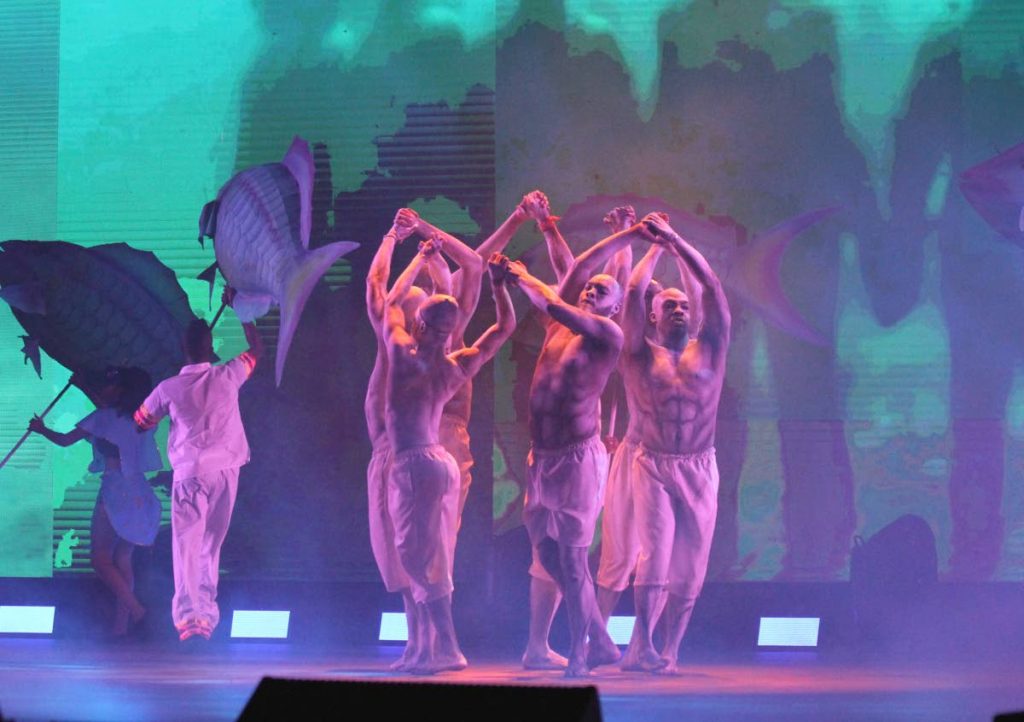Churning the ocean

Water destroys the world and out of this destruction came the birth of nations.
The ocean, churned by both gods and demons for the elixir of life yields many valuable gifts and divinities, among them the female goddess responsible for the health and wealth of her devotees.
The world, carried on the backs of four elephants who in turn, rests on the back of a giant turtle which drifts through space. The human child begins its life in a water world of sorts. Our bodies are estimated to be 60 per cent water. Water it is presumed, in some quarters will be the cause of World War III.
There is often a very fine line between fact and fiction but in either case we can all agree: water creates and destroys.
Carifesta XIV opened with the theme The Spirit of Wild Oceans, a grand production that received decent enough reviews from all who witnessed it either via social media or at the venue. As with any production attempting to represent a region as diverse as the Caribbean, mixed reviews are inevitable. But even more so, the volume of the comments is amplified given that the host country this year was our own. This column is however not concerned so much with the reviews as with the value of the story here.
This is an origin story. The turtles (a staple in many origin stories including Terry Pratchett’s make-believe world), the water life, the natives, the forests, the living earth – the ingredients are all there. The echo of primordial voices pervades the rendition. Gaia is invoked, Gaia the ancestral mother who "grasped the rhythmless dark…and composed the first symphony." This line of the narration forms the central image in this interpretation, speaking as it does to the Earth that gives birth to our songs, our rhythms, our stories.
The leatherbacks in this narrative are, like in other origin stories, the light bearers in a sense, ambassadors for peace. The leatherback is both a water and land being and it is not a surprise that in some mythology, it is represented as the life form that holds the Earth and everything in it. This concept of holding the Earth – the Earth comprising of water, land, sky and everything that inhabits both call us to acknowledge the interconnectedness of things, our own interconnectedness as a Caribbean people.
Water for us as a region, has been a pathway for both displacement and rooting. The story of the Caribbean is a result of the more negative uses of water, water as a pathway to conquest. Native tribes went to war against each other over land and waterways. Christopher Columbus came as a plunderer. The stories are not always happy ones yet, as we celebrate the making of the Caribbean and the connections we share through music, dance, the arts, we acknowledge the magic of the creative energy that comes of these negative encounters.
The spirit of wild oceans is a generative spirit, the creative spirit, a spirit that, like water, is fluid.
While Carifesta XIV celebrated our various national heritages, one wondered, what is the value of the origin story? It establishes, it roots, it provides valuable wisdom essentially. It instils pride, empowers. Among these empowerment stands out and empowerment for us is in our creative lives, not only in the spaces traditionally deemed the creative arts, but to note that the building of a nation is essentially a creative act.

The Caribbean continues to be a space in which the spirit of wild oceans can thrive. This is not just any ocean the narrative suggests. The adjective injects a certain type of power, a "wild" power. This wildness is not that of the unthinking animal operating on its basic instincts but the wildness that implies the courage to create in spite of. The Caribbean is, in spite of – in spite of slavery, in spite of indentureship, in spite of globalisation, in spite of… It began as the space in-between, continues to be the space in-between, neither West nor East, just on the edge of.
I wondered as I looked at some of the renditions at the Grand Market, aren’t celebrations of heritage also lamentations of loss? How do we then celebrate change? It is only natural that an inherited feeling of displacement should push people towards preservation. On the converse however, this heritage of displacement places us in the powerful position of creating. But, this is not a case for one or the other, both may exist in some harmony, the question is how. Exploring this question provides fertile ground for creative work and exploration, by its very nature, implies crossing lines that we may never have considered crossing to churn the depths of our own capabilities.


Comments
"Churning the ocean"